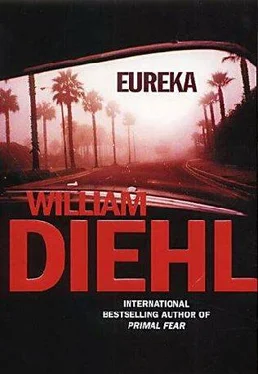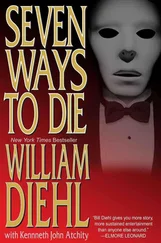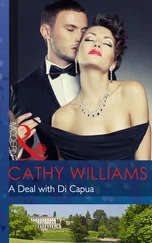William Diehl - Eureka
Здесь есть возможность читать онлайн «William Diehl - Eureka» весь текст электронной книги совершенно бесплатно (целиком полную версию без сокращений). В некоторых случаях можно слушать аудио, скачать через торрент в формате fb2 и присутствует краткое содержание. Жанр: Полицейский детектив, на английском языке. Описание произведения, (предисловие) а так же отзывы посетителей доступны на портале библиотеки ЛибКат.
- Название:Eureka
- Автор:
- Жанр:
- Год:неизвестен
- ISBN:нет данных
- Рейтинг книги:5 / 5. Голосов: 1
-
Избранное:Добавить в избранное
- Отзывы:
-
Ваша оценка:
- 100
- 1
- 2
- 3
- 4
- 5
Eureka: краткое содержание, описание и аннотация
Предлагаем к чтению аннотацию, описание, краткое содержание или предисловие (зависит от того, что написал сам автор книги «Eureka»). Если вы не нашли необходимую информацию о книге — напишите в комментариях, мы постараемся отыскать её.
Eureka — читать онлайн бесплатно полную книгу (весь текст) целиком
Ниже представлен текст книги, разбитый по страницам. Система сохранения места последней прочитанной страницы, позволяет с удобством читать онлайн бесплатно книгу «Eureka», без необходимости каждый раз заново искать на чём Вы остановились. Поставьте закладку, и сможете в любой момент перейти на страницу, на которой закончили чтение.
Интервал:
Закладка:
There were two other rooms, one the office of the manager of the club, a fluttery little perfectionist named Weldon Pettigrew who had been the concierge of a Chicago hotel, the other occupied by the telephone switchboard, run by a widow named Emma Shields, who had been trained in New York. The barkeeper, Gary Hennessey, had been imported from a hotel in New Orleans and spoke with an accent that was part Irish, part New York, and part Cajun.
Through the years, three apartments-for Pettigrew, Hennessey, and Mrs. Shields-had been built beside the clubhouse, and five small offices had been added to the clubhouse so its members could conduct business in private. Shields was the only woman allowed in the club except on rare occasions, when entertainers were brought in from San Francisco for the evening, and on New Year’s Eve, when all the family cooks prepared a feast and the new year was ushered in properly.
At all other times, it was a place where the tycoons gathered to smoke cigars, sip brandy, talk business, play cards, and keep in touch with their businesses by special long-distance phone lines. There was no restaurant. If a member wanted to eat, food was cooked at home and delivered by servants.
Tonight was a particularly special occasion at the Social House.
Tonight was the poker game between Eli Gorman and Shamus O’Dell.
The boys went to Brodie’s room on the pretense of studying, but quickly sneaked off through the woods to the Social House, Ben clutching his father’s opera glasses so they could see better. They cautiously entered through the back door and went up the stairs to the storage loft, crawling over cases of whiskey and sweeping away spiderwebs until they found a secluded place where they could watch the main floor without being seen.
They stared down at the arena.
All the tables but one had been moved to the side of the big room. A single table, with a felt cover and three chairs, held down the center of the room, spotlighted under the chandelier. Six bar chairs formed an arc five feet away from the empty spot at the table and six more were behind the chair opposite it. They were separated by an occasional brass spittoon. There were large Waterford ashtrays in front of each place at the table, with matching water glasses beside them and a Waterford pitcher to service them. The chandelier cast a sphere of light on the table. The twelve chairs were outside the orbit, in the dark. From the setup, Brodie figured there would be twelve spectators, six facing the empty seat at the table and six behind the dealer. Nobody would be seated behind the two players.
The game was set for 8:00 p.m.
Fifteen minutes before game time. The ritual began.
Buck Tallman arrived first, carrying a saddlebag. He draped his jacket over the middle chair. He was wearing a bright red vest, a white shirt with a blue string tie, and tan leather pants. The boys had never seen him that elegant. He carefully rolled up both his shirtsleeves halfway to the elbow. He sat down and growled across the room to Hennessey.
“A cup of black coffee if you please, Mr. Hennessey.”
He planted the saddlebag close to his right, opened it, took out ten virgin decks of cards, and placed them side by side in front of him. Hennessey, who was wearing a tuxedo for the occasion, brought the cup of coffee and placed it on the felt next to Tallman’s elbow. He nodded his thanks.
Spectators began to filter into the room and fill the gallery.
Eli Gorman arrived two minutes before the hour. He was dressed in a dark blue suit. A gold watch chain draped between the vest pockets on either side of his chest. He was carrying a black leather doctor’s satchel. He shook hands with Tallman and placed the satchel on the table.
His chair was below the boys. He sat with his back to them, but Brodie checked his position with the opera glasses. They would be able to see his hand over his right shoulder.
Gorman took out a thick packet of land deeds tied with twine and laid them next to the decks of cards. Then he took out a packet of ten-, twenty-, and hundred-dollar bills, stacked them in individual stacks, and counted out ten thousand dollars.
O’Dell was five minutes late, dressed in a garish light blue suit, an open-collared checked shirt, and a gray derby, which he hooked over the arm of his chair. His goods were in a small leather suitcase. He put his deeds on the opposite end of the line of cards from Gorman’s. He counted out ten thousand dollars in tens and hundreds.
Hennessey poured each of them a glass of water. O’Dell ordered a glass of Irish whiskey. Gorman shook his head when Hennessey looked at him. The bartender vanished into the darkened room.
Twenty thousand dollars lay on the table.
Tallman said, “Gentlemen, the game is poker. I will deal for each of you. Five- and seven-card stud and three-card draw, no wild cards. In straights and flushes, high card wins. If it’s a push, the pot will carry over to the next game. The ante is ten dollars. The limit is table stakes, the minimum bet will be ten dollars. The first player who can’t call a bet is out. Winner takes all, the deeds and twenty thousand dollars. Either player may ask for a new deck at any time. If so, the deal goes to the other player. I will flip a coin and the caller will select the first deck. Then you will draw a card for the first deal. We will take a fifteen-minute break whenever any of us requests it. Any questions?”
There were none.
Ben leaned close to Brodie’s ear. “What’s table stakes?” he whispered.
“Means you can bet whatever’s in the pot.”
Tallman said, “Then we’ll begin. Shake hands, gentlemen.”
“Forget it,” said O’Dell.
Gorman looked at Tallman and shrugged. He took his pince-nez from a vest pocket and set it near the end of his nose. Tallman took out a silver dollar and flipped it.
“Heads,” O’Dell snapped. The coin landed on the table, spun around, and came up tails. Gorman selected a deck and Tallman broke open the seal, took out the jokers, dropped them in the saddlebag. He swept the cards around the table, mixing them up, and splayed the deck out between the two players. Gorman pulled an eight, O’Dell turned a jack.
“Your game, Mr. O’Dell.”
“Five stud,” O’Dell said, in a high-pitched tenor voice that was a sharp contrast to the voices of Tallman and Gorman.
“Ante up,” said the dealer. O’Dell threw a ten-dollar bill in the center of the table and Gorman covered it.
“The game is five-card stud,” Tallman said. He shuffled and arched the cards together several times. He lay the deck in front of O’Dell, who cut them.
Tallman dealt the first card to Gorman. Both got one card down and one up. Eli lifted the corner of his hole card, let it snap back. A six of hearts.
Gorman drew a four of clubs. O’Dell, a seven of diamonds.
“Seven bets. The limit is twenty.”
O’Dell bet twenty dollars. Gorman called.
Sixty dollars in the pot.
Second up card: O’Dell, a queen of diamonds, Gorman, a nine of hearts.
Tallman: “Queen bets. The limit is sixty.”
O’Dell bet the limit again. Once again Gorman called.
A hundred and eighty dollars in the pot.
Third card: O’Dell, a seven of clubs. Gorman, a two of spades.
O’Dell had the lead with a pair of sevens. Gorman had a nine high. One card to go.
Gorman’s expression never changed as he stared over his glasses with his heavy-lidded eyes, glanced back at his card and stared back at O’Dell.
At this point, O’Dell’s open hand was a winner. The only way Gorman could win was if he paired his nine on the last card and O’Dell didn’t help his sevens. O’Dell sneaked a peek at his hole card. Gorman just stared at him, studying his expression, his eyes, any tics he might discern. O’Dell’s hole card could triple his sevens or pair either of his other three cards for two pair. The odds were strongly in O’Dell’s favor.
Читать дальшеИнтервал:
Закладка:
Похожие книги на «Eureka»
Представляем Вашему вниманию похожие книги на «Eureka» списком для выбора. Мы отобрали схожую по названию и смыслу литературу в надежде предоставить читателям больше вариантов отыскать новые, интересные, ещё непрочитанные произведения.
Обсуждение, отзывы о книге «Eureka» и просто собственные мнения читателей. Оставьте ваши комментарии, напишите, что Вы думаете о произведении, его смысле или главных героях. Укажите что конкретно понравилось, а что нет, и почему Вы так считаете.












